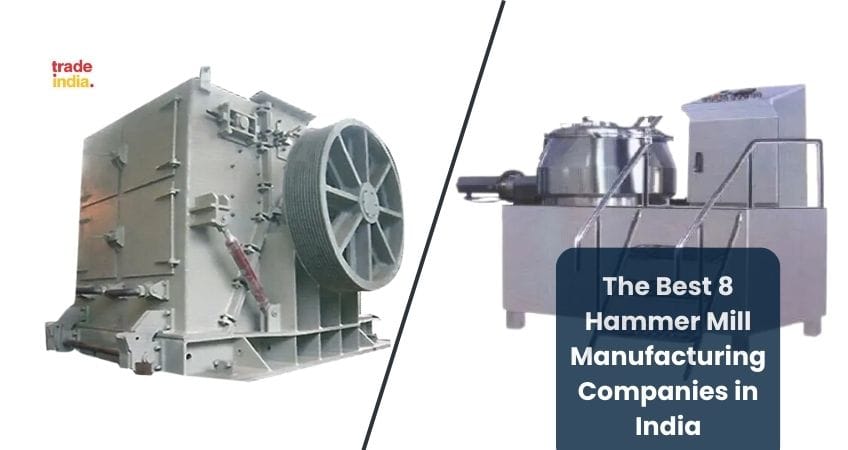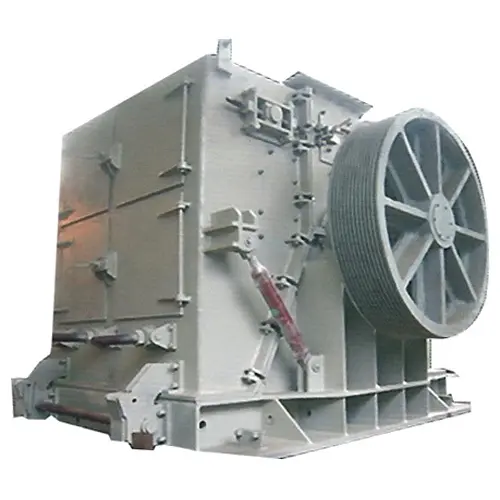The Best 8 Hammer Mill Manufacturing Companies in India

Hammer mills are one of the impeccable machines of different industries such as mining, agro, pharma, and other sectors. They are widely used in high-quality manufacturing processes to reduce the size of products efficiently. These mills are designed using heavy-duty steel drums with a horizontal rotating shaft and hammers. The materials to be processed enter the machine, and rotating hammers shatter them into smaller particles in different sizes and shapes according to the specific applications.
Types of Hammer Mills
Gravity discharge hammer mills are ideal for discharging light, fibrous materials.
Pneumatic-assisted hammer mills are used for materials prone to heat generation during the grinding process.
Design of Hammer Mills
Today, manufacturing units use advanced simulation tools and computer-aided design software to create hammer mills. It comprises different crucial components such as the hammers, the housing, the rotor, the screen, and the discharge mechanism. The rotor acts as the heart of the hammer mill, the screen controls the final particle size, and the housing offers a shielding enclosure for the components. Reversible hammers are also created to enhance the lifespan of the hammer mill by enabling even wear distribution.
The manufacturing procedure of a hammer mill is meticulous and requires careful attention to design, engineering, and production. As it impacts the productivity and quality of the processes, manufacturing units create innovative solutions with safety features.
The Best 8 Hammer Mill Manufacturing Companies in India
When it comes to looking for reliable manufacturing units to create quality hammer mills, India has become one of the prime choices. The country boasts several top-notch hammer mill dealers, reckoned for their commitment to dedication, novelty, product quality, and customer satisfaction. In this blog, the top manufacturers of hammer mills are listed to help you choose the best:
Bhalani Industries:
Located in Ahmedabad, India, Bhalani Industries has gained expertise in manufacturing high-end hammer mills for a wide range of industries. The company is devoted to innovation, quality, and perfection, creating high-end solutions to its clients.
Fab-Tech Engineers:
Fab-Tech Engineers is dedicated to quality and excellence, ensuring to provide the best to the industries. Located in Ahmedabad, India, it has become one of the key hammer mill manufacturers, offering unsurpassed solutions for consistent and uniform particle size reduction.
Kaps Engineers:
Situated in Vadodara, Gujarat, Kaps Engineers has become one of the leading hammer mill manufacturers in the industry. Since 1965, we have successfully executed more than 8000 installations and 7500 trial test data banks of application materials.
M/s Shri Krishna Pulverizer & Engineering Works:
It is headquartered in Kanpur, Uttar Pradesh, and is a key player in the hammer mill manufacturing sector. The company caters to diverse industries, from agro chemicals to food processing, with a wide range of technically sound and efficient machines. Since 1966, the company has been offering creative mills for carrying out milling tasks in a speedy and efficient manner.
Precious Fab Cast Pvt. Ltd.:
Precious Fab Cast Pvt. Ltd. is one of the prominent hammer mill dealers located in Ahmedabad, India. The company creates valuable solutions for milling brittle and fibrous materials with excellent efficiency. Its commitment to constant improvement and product innovation helps the company stay ahead in the market.
Premium Pulman Pvt. Ltd.:
With more than two decades of expertise and experience, the company has done over 5,000 grinding installations worldwide. Its prime focus is precision engineering and innovative design, which make it an ideal choice for the pharmaceutical, chemical, and food processing industries.
Singhasini Industries:
Singhasini Industries was incepted in the late 1950s as one of the key hammer mill suppliers in India, providing high-end products. The company is headquartered in Kanpur, Uttar Pradesh, and develops hammer mills that deliver outstanding performance in diverse applications. With decades of experience in the industry, we have been offering creative and modern products in unmatched designs.
Techno Wings:
Techno Wings is one of the prime hammer mill manufacturers, offering technically-sound products for conducting milling operations. They are known for matchless engineering, versatility, and minimal downtime.
So, if you are looking to select the best hammer mill manufacturing companies, these are the perfect choices. They have gained a notable position in the market owing to their client-centric approaches, technological advancements, and vast expertise.
FAQs: Hammer Mill
Q. What is a hammer mill? How does it operate?
Ans. A hammer mill is one of the machines utilized to decrease the size of materials through repeated blows delivered by hammers. It finds application in sectors such as agro, biomass, wood, minerals, and others. Here's a breakdown of how a hammer mill works:
To begin the process, the material is introduced into the grinding chamber through an inlet. This can be done manually via gravity or using other methods. Inside the grinding chamber, there's a rotating shaft connected to hammers that swing freely on their ends or are fixed to a rotor. As the rotor spins, these hammers deliver impacts on the material.
The forceful impact from the hammers causes the material to shatter into particles. To achieve the desired particle size, adjustments can be made to the screen or grate. Once the material reaches its particle size, it passes through holes in the screen. The resulting ground material is then collected from beneath the hammer mill.
Q. What are some applications for hammer mills?
Ans. Recycling facilities use shredding and pulverising techniques to process waste materials like tyres, cardboard, plastics, and more.
Wood processing, for reducing wood chips, sawdust, and other wood particles.
The pharmaceutical industry utilises particle size reduction methods to decrease the size of ingredients (APIs) and excipients.
In mineral and mining operations, crushing processes are employed to break down ores, coal, and other minerals.
Food processing involves grinding and processing various food products such as spices, herbs, grains, etc.
Fertilizer production to grind ammonium sulphate, potassium chloride, and phosphates.
Ethanol production for grinding biomass materials such as corn, sorghum, etc.
Chemicals and raw materials to attain the desired particle size for further processing or blending.
Animal feed production to grind grains and other ingredients into fine particles.
Agriculture to shred crop residues and by-products for processing materials such as straw, corn stover, etc.
Q. What are the different types of hammer mills available?
Ans. Full-Screen Hammer Mill: Its large perforated screen covers the entire grinding chamber to ensure maximum grinding area and enhance the throughput of the mill.
Gravity Discharge Hammer Mill: The material is fed into the grinding chamber and falls by gravity to the bottom of the mill. The hammer is mounted on a rotating shaft to reduce light, fibrous, or non-abrasive materials into smaller particles.
Half-Screen Hammer Mill: It has a screen or grate covering part of the grinding chamber to ensure better discharge of large particles. It is ideal to be used in coarse grinding applications like pre-grinding for fine grinding or processing bulky materials.
Laboratory-Scale Hammer Mill: It is a smaller version of industrial hammer mills designed for small-scale production. This is used in laboratories and pilot plants for evaluating new materials, carrying out quality control tests, and deciding optimal grinding parameters.
Pneumatic Assist Hammer Mill: It incorporates a pneumatic air system to help the grinding process. The airflow conveys the ground material out of the grinding chamber through the screen or grate.
Reversible Hammer Mill: It is designed with hammers that can be rotated to ensure no wearing on both sides and extend the hammers' lifespan. It is widely used in applications where the material has a high wear rate.
Q. What are the advantages of using a hammer mill for size reduction?
Ans. By changing the screen covering the discharge opening, the size of the ground material can be changed.
Can handle both soft and hard materials without wear and tear.
Cost-effective solution for a wide range of industries and applications.
Create a more consistent and easier-to-handle product.
Efficient grinding with minimal energy loss.
Highly versatile machines are used for reducing the size of wood, biomass, minerals, grains, agricultural products, and more.
Produce relatively low heat during the grinding process.
Provide efficient and rapid size reduction owing to the repeated impact of the hammers on the material.
Simple to operate and easy to maintain, it needs routine maintenance tasks.
Uniform particle size distribution to ensure uniformity and consistency in the final product.
Q. Can a hammer mill be used for both coarse and fine grinding?
Ans. Yes, a hammer mill is used for both coarse and fine grinding to manage different materials and adjust the particle sizes of the final product.
Coarse Grinding: The hammer strikes the incoming material with force to break down large particles into smaller pieces. The coarse grinding process is used for initial size reduction or materials with larger particle sizes.
Fine Grinding: This is used to reduce the size of the particles in fine-grinding applications. Finer screens with smaller holes are used in the hammer mill to enable small particles to pass through and develop a fine final product.
Related Blog:

